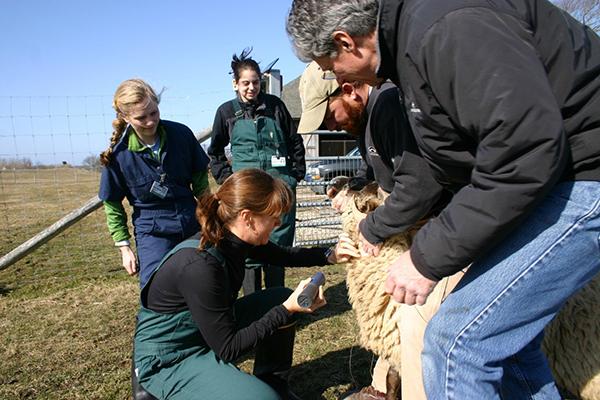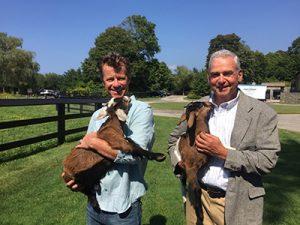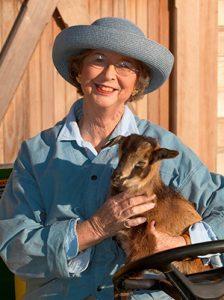-
About
- Leadership & Faculty
- News & Events
-
Academics
- Graduate
- Advanced Clinical Training
- Continuing Education
- Academic Departments
- Academic Offices
- Simulation Experiences
-
Student Life
-
Research
-
Hospitals & Clinics
- Emergency Care
- Hospital Services
-
Community Outreach
- Volunteer
Historic $3.5M Gift Received from SVF Foundation
Dorrance H. Hamilton Professorship in Applied Reproductive Medicine established

Cummings School of Veterinary Medicine at Tufts University has received a historic $3.5 million gift from SVF Foundation to establish the Dorrance H. Hamilton Professorship in Applied Reproductive Medicine. It is the largest gift to fund a professorship the school has ever received.
Since 2001, Cummings School has collaborated with Swiss Village Farm (SVF) Foundation in Newport, Rhode Island. Together, they recently completed the SVF Biodiversity Preservation Project, a 20-year endeavor of collecting and cryopreserving more than 100,000 samples of germplasm (semen and embryos), blood, and somatic cells from over 1,100 animals, across 36 breeds, including cattle, goats, and sheep.
The seed bank of genetic material resides at the Dorrance Hamilton Cryo Conservation Laboratory at the Smithsonian Conservation Biology Institute in Virginia. Hamilton founded SVF Foundation in 1999 to create the seed bank, according to George Saperstein, D.V.M., Cummings School professor emeritus and a Board member of the SVF Foundation.
Much of the Preservation Project work was accomplished by faculty members from Cummings School, including Saperstein, Theriogenologist and Assistant Professor David Matsas, Associate Professor Eugene White, former Professor Kevin Lindell, and late Associate Professor Howard Levine.
More than 300 Cummings School fourth-year veterinary students visited and participated in germplasm collection over the course of the project, according to Matsas. “Students scrubbed in as assistant surgeons, intubated animals, monitored anesthesia, and recovered them. It was such a unique opportunity that students from other veterinary schools also arranged externships to gain this experience,” he says.
The Endowed Professorship
The Dorrance H. Hamilton Professorship in Applied Reproductive Medicine will ensure that Cummings School retains its leadership role in applied animal reproduction in New England and nationally.
“Animal reproduction is essential to many different aspects of veterinary medicine and animal health,” explains Cummings School Dean and Henry and Lois Foster Professor Alastair Cribb. “What is unique about this professorship is that it will focus on bringing together genomics and advanced reproductive technologies to support animal health and productivity, using genomic resources that have been preserved through the collaboration between Cummings School and the Swiss Village Farm Foundation.
“The foresight of Dorrance Hamilton will continue to have an impact through this professorship and will ensure that we continue our history of excellence in education, research, and veterinary care in applied animal reproduction.”
The position will join the Department of Ambulatory Medicine and Theriogenology, based in Woodstock, Connecticut. The clinical service arm of this department, Tufts Veterinary Field Service (TVFS), has provided the highest quality service to the agricultural community of southern New England for 40 years. TVFS cares for nearly 55,000 animals annually, including some 49,000 bovines on over 70 dairy farms.
“Adding this endowed professorship will attract and retain the best people in the field, support and drive new research in applied animal reproduction, and provide new and unique learning opportunities for our students,” Matsas says.
Saperstein adds, “It will help to rebuild the core of reproductive specialists at Cummings School, which is the heart of veterinary medicine.” He hopes that the appointed faculty member will teach the students reproductive medicine and use biotechnology to further the science, the research, and the genetic diversity by working with the Smithsonian and the seed bank.
The Seed Bank’s Role in the Future
Saperstein believes that among Hamilton’s many philanthropic projects, this is her greatest legacy. “The seed bank is unique,” he notes. “And as far as I know it is the most comprehensive privately funded lifestyle seed bank in the world. It contains all the endangered breeds of livestock.”
Matsas agrees that this rich genetic material holds tremendous value for the future by continuing the preservation of heritage breed biodiversity. Ultimately, Matsas hopes the endowed professorship will provide opportunities to investigate the stored biodiversity in the collection to help solve real world problems.
“Within this rich frozen library of genetic resources may lie solutions to potential threats to our food security from emerging infectious diseases and climate change. These solutions may be in the form of genes or traits for disease resistance, parasite resistance, or tolerance to heat, cold, and drought.” Matsas contends.
“Much of the biodiversity that may allow adaptation to changing climate and disease challenges has likely been lost or diminished in our modern-day agricultural animals, which for decades have been highly selected for traits solely or largely focused on growth or production which has created a vulnerable population. The tremendous advances in genomics and genomic technology over the past 20 years may now allow us to ‘read’ and search this frozen library to find the tools we may need to protect the future of the food supply in an ever-changing world.”

